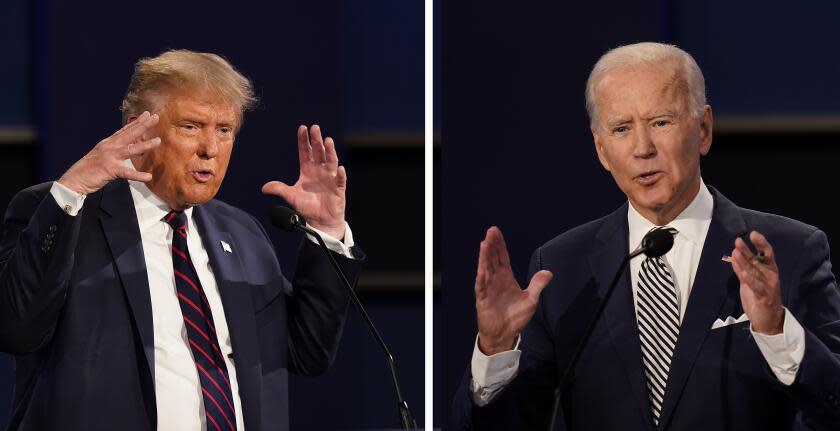CNN is sharing its presidential debate with rivals. But there are strings attached

CNN's deal to produce the first debate of the 2024 presidential election cycle is a major coup for the news network. It won't let viewers forget it.
The scheduled June 27 showdown between the presumptive nominees, President Biden and former President Trump, is the first time in history that a single TV network has landed exclusive rights to present a general election debate.
The first presidential debate in 2020 between the same two candidates attracted an audience of 73 million viewers, making it one of the last mass audience experiences left in a highly fragmented TV landscape. It's a much-needed win for the Warner Bros. Discovery-owned news network that has been racked by executive shakeups, budget cuts and declining ratings in recent years.
And CNN isn't going to let such a stature-building opportunity go to waste. Instead of the blue background showing the constitution, as seen in previous presidential debates, viewers will see the red CNN logo. The event will provide a major platform for CNN anchors Jake Tapper and Dana Bash, who will serve as moderators at the network’s studio in Atlanta.
But the potential for blockbuster ratings on CNN will be mitigated by the network’s decision to provide a feed of its production to other networks and digital outlets. CNN is making the offer as a public service. Every presidential debate held since 1960 has aired commercial free across the major broadcast networks and, in later years, on cable news outlets CNN, Fox News and MSNBC.
So, in order to maximize the opportunity the debate offers, CNN is putting restrictions on the use of the simulcast, right down to what it should be called. A list of conditions has gone out to outlets interested in carrying the event, according to several executives who were not authorized to discuss the matter publicly.
The CNN’s on-screen logo — or "bug," as its often called — must appear throughout the simulcast, according to the network's conditions. Other networks can put their bugs on the screen as well, but they can’t obscure CNN's graphic.
CNN is also requiring other outlets to refer to the event as the “CNN Presidential Debate.” If a network runs any on-air promotions or advertising for the telecast, it must be referred to as the “CNN Presidential Debate Simulcast” and use artwork provided by CNN. In program guides and TV listings, it must be called "Simulcast: CNN Presidential Debate."
Read more: Trump refuses remote debate with Biden. Nixon and Kennedy did one 60 years ago today
In a break with the tradition of having general presidential debates proceed ad-free, there will be two commercial breaks in the 90-minute showdown, each running 3 1/2 minutes. Outlets running the simulcast can put their own commercials and promos in the breaks or run the spots sold by CNN.
However, other networks cannot insert their own anchors and commentators during the breaks or any other portion of the telecast — only before and after the event. Squeezing back the image of the debate stage onscreen so a pundit or rival anchor can chime in will be forbidden. Outlets that violate the terms will lose the right to carry the feed.
As of Friday, rival network executives said they were pushing back on some of CNN's requirements. Some networks may choose not to promote the simulcast on their air if they are forced to mention CNN every time.
A CNN representative confirmed the network's requirements for the rights to the simulcast, noting that they are being requested in return for covering the full cost of the production.
"CNN is unilaterally producing this debate, and that requires transparency with viewers and a substantial investment of resources," the representative said. "CNN will provide the debate for free on CNN.com and make it available across a wide variety of news sources in order to reach as many Americans as possible."
While no formal announcements have been made, all of the major networks and news channels are expected to carry the debate, according to several executives at CNN's competitors. The networks need to commit several days before the event so it can be listed in electronic programming guides and TV listings.
Mark Lukasiewicz, a former NBC News executive who is now dean of the journalism school at Hofstra University, said he believes the CNN requirements are a reasonable trade-off for a simulcast that other networks can run with their own commercials.
"I think this is a very fair arrangement," said Lukasiewicz, who worked on several debates while at NBC. "It’s a good model if this how the networks do the debates going forward. I hope they take CNN up on this offer so the debate is seen as widely as possible."
CNN raised its hand after the Biden and Trump campaigns decided not to go through the Commission on Presidential Debates, the nonpartisan group that has overseen the events since 1988, setting the rules and choosing the venues and moderators. One of the major networks would provide cameras and other technical assistance but had no influence on the production.
The Biden and Trump campaigns agreed to two head-to-head match-ups, one on CNN and the other on Walt Disney Co.'s ABC on Sept. 10, which will be moderated by David Muir and Linsey Davis. Vice President Kamala Harris has agreed to a debate Trump's still-to-be-determined running mate on CBS. The Trump campaign has accepted an invitation for a vice presidential debate on Fox News.
This story originally appeared in Los Angeles Times.


